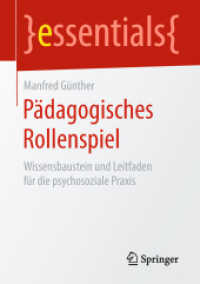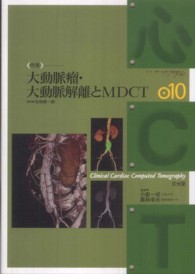Full Description
Within the discipline of criminology and criminal justice, relatively little attention has been paid to the relationship between criminal law, punishment, and imperialism, or the contours and exercise of penal power in the Global South. Decolonizing the Criminal Question is the first work of its kind to comprehensively place colonialism and its legacies at the heart of criminological enquiry.
By examining the reverberations of colonial history and logics in the operation of penal power, this volume explores the uneasy relationship between criminal justice and colonialism, bringing relevance of these legacies in criminological enquiries to the forefront of the discussion. It invites and pursues a better understanding of the links between imperialism and colonialism on the one hand, and nationalism and globalization on the other, by exposing the imprints of these links on processes of marginalization, racialization, and exclusion that are central to contemporary criminal justice practices. Covering a range of jurisdictions and themes, Decolonizing the Criminal Question details how colonial and imperial domination relied on the internalization of hierarchies and identities — for example, racial, geographical, and geopolitical — of both the colonized and the colonizer, and shaped their subjectivity through imageries, discourses, and technologies.
Offering innovative, conceptual, and methodological approaches to the study of the criminal question, this work is an essential read for scholars not only focused on criminology and criminal justice, but also for scholars in law, anthropology, sociology, politics, history, and a range of other disciplines in the humanities and social sciences.
Decolonizing the Criminal Question is an open access title available under the terms of a CC BY-NC-ND 4.0 International licence. It is free to download from OUP and selected open access locations.
Contents
Mark Brown: Foreword
Ana Aliverti, Henrique Carvalho, Anastasia Chamberlen, and Máximo Sozzo: Introduction
Part 1: Unsettling Concepts and Perspectives
1: Chris Cunneen: Decoloniality, Abolitionism, and the Disruption of Penal Power
2: John Moore: Abolition and (De)colonization: Cutting the Criminal Questions Gordian Knot
3: Manuel Iturralde: The Weight of Empire: Crime, Violence, and Social Control in Latin America - and the promise of Southern Criminology
4: Biko Agozino: From Genocidal Imperialist Despotism to Genocidal Neocolonial Dictatorship: Decolonizing criminology and criminal justice with indigenous models of democratisation
Part 2: Contextualizing the Criminal Question
5: Zoha Waseem: The Postcolonial Condition of Policing? Exploring Policing and Social Movements in Pakistan and Nigeria
6: Gail Super: Extrajudicial Punishment and the Criminal Question: The case of postcolonial South Africa
7: Mahuya Bandyopadhyay: Carceral Cultures in Contemporary India
Part 3: Locating Colonial Duress
8: Sarah Ghabrial: "Muslims have no borders, only horizons": A genealogy of border criminality in Algeria and France 1844 to present
9: Omar Phoenix Khan: The Coloniality of Justice: Naturalised divisions during pre-trial hearings in Brazil
10: Maayan Ravid: Contextualizing Racialized Exclusion in Criminalization in Postcolonial Israel: Policing of Israeli Ethiopian Citizens and Detention of Sudanese and Eritrean Asylum Seekers
11: Hugo Leonardo Rodrigues Santos: Coloniality and Structural Violence in the Criminalization of Black and Indigenous Populations in Brazil
Part 4: Mapping Global Connections
12: Conor O'Reilly: Emancipatory Pathways or Postcolonial Pitfalls? Navigating global policing mobilities through the atlantic archipelago of Cape Verde
13: Melanie Collard: "Nothing is Lost, Everything is ... Transferred": Transnational institutionalization and ideological legitimation of torture as a postcolonial state crime
14: Lucy Harry: The Legacy of Colonial Patriarchy in the Current Administration of the Malaysian Death Penalty: The hyper-sentencing of foreign national women to death for drug trafficking
Part 5: Moving Forward: New Methods and Approaches
15: Rod Earle, Alpa Parmar, and Coretta Phillips: Criminal Questions, Colonial Hinterlands, Personal Experience: A symptomatic reading
16: Lucia Bracco Bruce: Ayllu and Mestizaje: A decolonial feminist view of women's imprisonment in Peru
17: Amanda Wilson: An Alternative Spotlight: Colonial legacies, therapeutic jurisprudence and the enigma of healing
18: Kwan-Lamar Blount-Hill and Ahmed Ajil: In Our Experience: Recognizing and challenging cognitive imperialism
Ana Aliverti, Henrique Carvalho, Anastasia Chamberlen, and Máximo Sozzo: Conclusion: Teasing Out the Criminal Question, Building a Decolonizing Horizon








